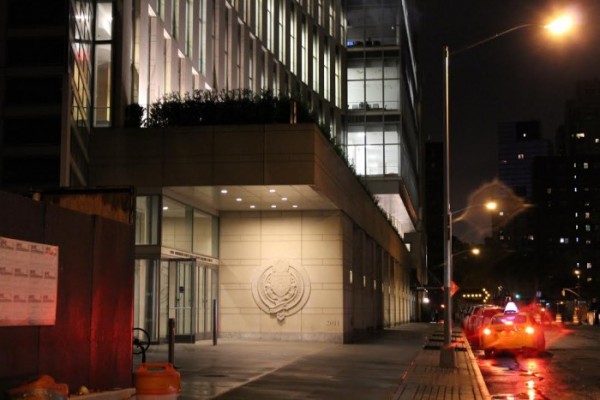Middle States Highlights Financial Issues
Fordham’s residence halls are exclusionary to transgender and gender non-conforming (TGNC) students. (CONNOR MANNION/THE OBSERVER)
April 27, 2016
As a part of the University’s ongoing accreditation process, the Middle States Visitation Team evaluated Fordham in early April and has issued a report summarizing their evaluation. The report, sent to the Middle States Commission on Higher Education, was “very positive,” according to Father Grimes, but highlighted issues regarding diversity and financial resources.
“I think the biggest things that I picked up from the report were the call for greater diversity amongst faculty and administration [and] the caution that we don’t have the financial resources to do everything that’s planned that at the present time we would need,” Grimes said. “We’ve got to solve the financial resource problem if we want to do the things we say we want to do, which quite frankly was not a surprise to anybody. We’re aware of those things.”
Stating that financial issues are major at colleges and universities across the country, Grimes drew specific attention to the University’s financial dependency on tuition.
“Clearly tuition has reached a point that it can’t be raised significantly and for a school like Fordham, that’s what over 90 percent of our income is: tuition,” Grimes said.
Currently, Fordham’s tuition is $47,317 per year. Tuition has increased by approximately 65 percent since 2005 and by approximately 22 percent since 2010, according to the National Center for Education Statistics, the “primary federal entity for collecting and analyzing data related to education in the U.S. and other nations.”
The University’s dependency on tuition and the limits of its funds are things that “people fail to realize quite often,” according to Grimes. “‘We want this’ or ‘we want this’ or ‘these people should be paid more’ or ‘we want a new building here.’ But how are you going to pay for it is the constant issue.”
Jonathon Crystal, assistant vice president of Academic Affairs in the Office of Provost, said that “in terms of resources, I think that they were saying that hard decisions are going to have to be made, that we need to be realistic about what we’re able to accomplish.”
“In terms of additional expenditures of resources, we need to work on developing new sources of revenue and emphasizing development and fundraising, that kind of thing,” Crystal said. He added that we want “to think in terms of developing a long term budgeting model to help us make those decisions effectively.”
Regarding steps that the University will take moving forward to address these issues, Grimes called attention to Continuous University Strategic Planning (CUSP).
CUSP “is really the way in which we address those concerns and the whole future of the University, which is just getting underway,” Grimes said. “ And certainly diversity is very high on the list of CUSP issues.”
Crystal added that the Middle State Visitation Team also drew attention to the Fordham Community being optimistic about the CUSP process. According to previous reporting by The Observer, however, members of the Fordham Community, such as those in the Fordham Lincoln Center College Council, are critical of CUSP for being too vague.
According to Crystal, the Visitation Team also emphasized the “pervasiveness” of the Fordham Community’s “sense of mission” and made suggestions regarding student affairs, the core curriculum and governance.
Both Grimes and Crystal stated that the Visitation Team’s report was largely “positive.”
“When Middle States does these visits, there’s a number of possible outcomes,” Crystal said. “Sometimes they will ask the institution to do a follow-up report, saying yes, they’re compliant with the standards of accreditation, but we want to see that you’re going to continue to implement what you say you’re doing. That’s a progress report.”
The Visitation Team could also file “a monitoring report, saying yes you’re in compliance, but we need to just be sure, so we’ll come back in two years, or we want a report in two years,” he continued. “And they didn’t do any of those things.”
Additionally, “much of the time, they will provide suggestions, which are non-binding suggestions from the [Visitation] Team, or recommendations, which are more serious than suggestions,” Crystal explained. “[With] recommendations, we, the University, would be obligated to somehow respond. And it’s very, very common for institutions to receive recommendations. But we did not receive any recommendations, which is in my mind is a very positive vote of confidence in what Fordham is doing.” He added that Fordham did receive “a lot of suggestions,” but “no recommendations.”
“It looks like we have come through this very well,” Grimes said. “10 years ago we went through and [got] a clean bill of health and it looks like there’s a good chance that that will happen again and I certainly hope that’s the case.”
“They came here not expecting Fordham to be perfect because no university is perfect,” Crystal added. “What they’re really looking for is whether we are focused on improving what we do, being more effective in serving students. And I was just really happy that they found that there is a commitment here among everyone, from administrators, students, faculty, to providing a great educational experience for our students because that’s really what our mission is all about.”
The University has not yet been officially reaccredited and is expected to be notified of its accreditation status in May. If reaccredited, the accreditation will be for eight years, rather than 10, as has been the case in the past, due to a change in the Middle States accreditation process, according to Grimes.













Ben • May 3, 2016 at 12:37 pm
It would be nice to see Fordham grow both in ranks and in academia. Perhaps Fordham can merge with Lehman College and create a medical school on that campus. Fordham Rose Hill needs to continue to grow. By merging with Lehman College, Fordham can in fact grow tremendously. Fordham can also diversify by not only allowing local community students from entering Fordham but perhaps on a more international level can help those abroad enter Fordham for a true learning experience. This is completely hypothetical as it will never happen but it would be very, very interesting.